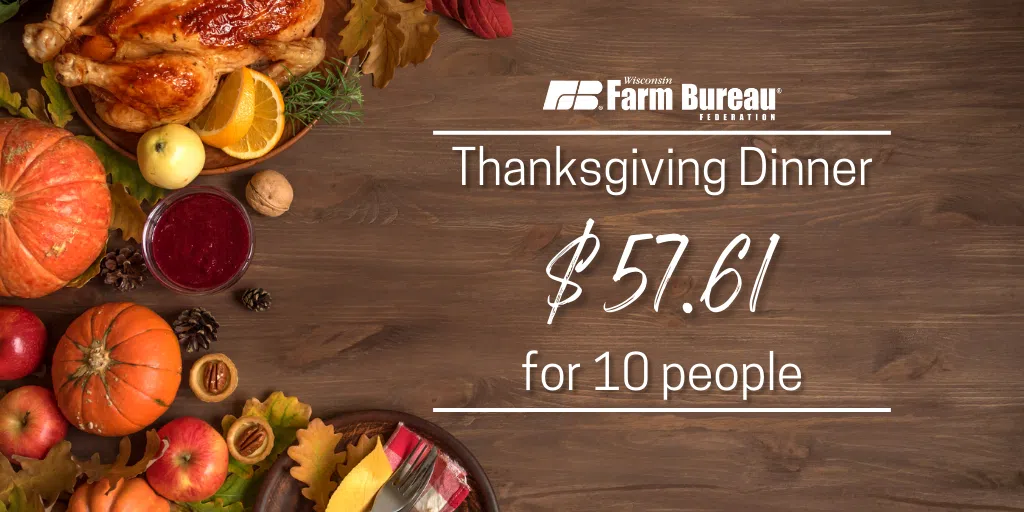MADISON – The price of a traditional Thanksgiving meal in Wisconsin is 2.1% less this year according to Wisconsin Farm Bureau’s annual Marketbasket survey that rang in at $57.61.
“Wisconsin agricultural production and food processing have increased 10.9 percent in recent years,” said WFBF Senior Director of Public Relations Cassie Sonnentag. “The abundance and diversity of agriculture in Wisconsin continues to be reflected in Wisconsin’s Marketbasket survey results.”
The Marketbasket survey looks at the price of popular food items used to prepare a Thanksgiving meal sufficient to serve 10 people. This survey allows for Wisconsin food prices to be compared with food prices from across the country. Comparatively, the American Farm Bureau Federation’s survey of the same items showed a 5% decrease from 2023 with prices nationally at $58.08.
ABOUT THE SURVEY
Wisconsin’s Thanksgiving Marketbasket survey is an informal, annual review of food price trends in relation to changing farm prices, weather and wholesale and retail food marketing. Wisconsin Farm Bureau members collected price samples of 15 Thanksgiving food items in November.
Farm Bureau volunteer shoppers were asked to look for the best prices, without taking advantage of special promotional coupons or purchase deals.
This is the second year in a row, shoppers are seeing a decline in Thanksgiving meal costs both in Wisconsin and nationally. However, the moderate decline does not erase dramatic price increases experienced in 2022, when both state and national surveys reached record highs.
“Despite food price fluctuations, the farmer’s share of the food dollar remains at 15.9 cents per dollar,” said Sonnentag. “At the end of the day, farmers continue to feel the strain of increased input costs; they are price takers, not price makers.”
| Wis. 2024 | Wis. 2023 | National 2024 | National 2023 | |
| Turkey, 16 lbs. | $25.60 | $26.56 | $25.67 | $27.35 |
| Milk, 1 gallon whole | $3.24 | $3.24 | $3.21 | $3.74 |
| Cream, half pint | $2.06 | $1.94 | $1.81 | $1.73 |
| Dinner rolls, 12 | $3.79 | $3.63 | $4.16 | $3.84 |
| Relish tray (1 lb. carrots/celery) | $0.86 | $0.88 | $0.84 | $0.90 |
| Fresh cranberries, 12 oz. | $2.20 | $2.29 | $2.35 | $2.10 |
| Pumpkin pie mix, 30 oz. | $4.23 | $4.35 | $4.15 | $4.44 |
| Pie shells (2) | $3.42 | $3.58 | $3.40 | $3.50 |
| Cube stuffing, 14 oz. | $3.59 | $3.16 | $4.08 | $3.77 |
| Sweet potatoes, 3 lbs. | $3.15 | $3.42 | $2.93 | $3.97 |
| Frozen green beans, 1 lb. | $1.72 | $1.86 | $1.73 | $1.88 |
| Miscellaneous ingredients | $3.75 | $3.95 | $3.75 | $3.95 |
| TOTAL | $57.61 | $58.86 | $58.08 | $61.17 |
PROTECTING PRICES WITH A MODERNIZED FARM BILL
“While shoppers can appreciate a lower grocery bill, a modernized farm bill to safeguard those prices and support farmers is long overdue,” said WFBF Director of National Affairs Tyler Wenzlaff.
The impact of the farm bill reaches far beyond the fields, playing a crucial role in protecting the nation’s food supply by ensuring access to nutrition for those in need, advancing conservation efforts and driving innovation through research. For farmers, it’s a vital safety net—helping them weather unpredictable challenges like natural disasters, soaring input costs and inflationary pressures, all of which threaten their ability to produce the food we rely on.
Recent disruptions to the food supply chain, amplified by the COVID-19 pandemic, have underscored the urgent need for a farm bill that addresses the realities farmers face today.
“In the United States, 84% of adults agree it’s a matter of national security to maintain a safe and abundant food supply,” said Wenzlaff. “Both farmers and consumers deserve a forward-looking, five-year farm bill, and it’s time for Congress to prioritize this essential legislation.”
PROTECTING YOUR FAMILY WITH FOOD SAFETY
You can make it a safe holiday by prioritizing food safety. According to Gather Wisconsin, a few simple practices can go a long way in reducing the risk of foodborne illness:
- Proper thawing: Turkeys, in particular, require ample time to thaw safely. The best method is to thaw your turkey in the refrigerator, allowing 24 hours for every 4 to 5 pounds of meat. Avoid thawing at room temperature, as it can encourage bacteria growth.
- Cleanliness: Wash your hands thoroughly before and after handling food, and clean cutting boards, utensils and countertops with hot, soapy water to avoid cross-contamination. Don’t forget to rinse fruits and vegetables under running water to remove bacteria before serving or cooking.
- Temperature: Using a food thermometer is the best way to ensure your holiday meats are cooked to safe internal temperatures. For turkey, aim for an internal temperature of 165°F in the thickest part of the breast and thighs. If you’re cooking stuffing inside the turkey, ensure it also reaches 165°F, or consider preparing it separately.
- Proper storage and reheating: After the meal, refrigerate leftovers promptly—within two hours of cooking—and use shallow containers to help food cool quickly. When reheating, bring leftovers to an internal temperature of 165°F, and enjoy them within 3 to 4 days of the holiday.
For more information about food safety and other questions regarding food this holiday season, visit GatherWisconsin.com.






Comments